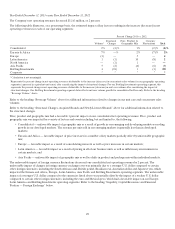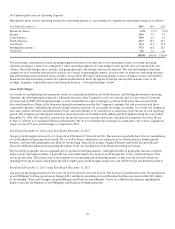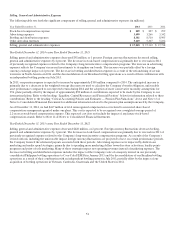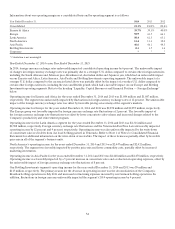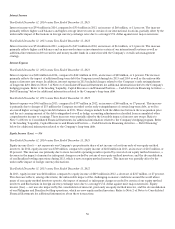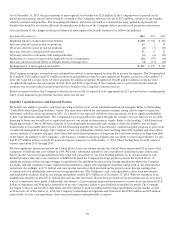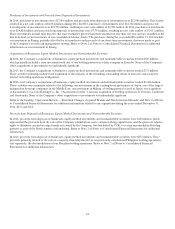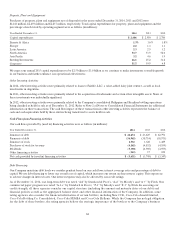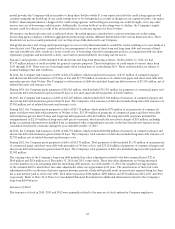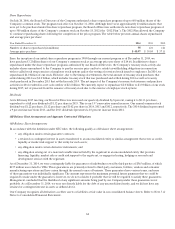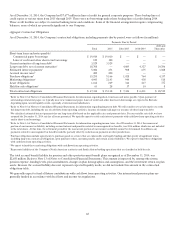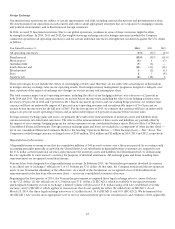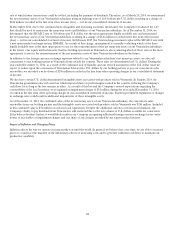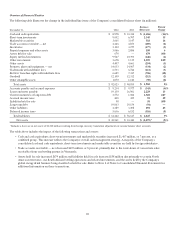Coca Cola 2014 Annual Report Download - page 61
Download and view the complete annual report
Please find page 61 of the 2014 Coca Cola annual report below. You can navigate through the pages in the report by either clicking on the pages listed below, or by using the keyword search tool below to find specific information within the annual report.
59
As of December 31, 2014, the gross amount of unrecognized tax benefits was $211 million. If the Company were to prevail on all
uncertain tax positions, the net effect would be a benefit to the Company’s effective tax rate of $173 million, exclusive of any benefits
related to interest and penalties. The remaining $38 million, which was recorded as a deferred tax asset, primarily represents tax
benefits that would be received in different tax jurisdictions in the event the Company did not prevail on all uncertain tax positions.
A reconciliation of the changes in the gross balance of unrecognized tax benefit amounts is as follows (in millions):
Year Ended December 31, 2014 2013 2012
Beginning balance of unrecognized tax benefits $ 230 $ 302 $ 320
Increases related to prior period tax positions 13 1 69
Decreases related to prior period tax positions (2) (7) (15)
Increases related to current period tax positions 11 8 23
Decreases related to settlements with taxing authorities (5) (4)
(45)
Reductions as a result of a lapse of the applicable statute of limitations (32) (59) (36)
Increases (decreases) from effects of foreign currency exchange rates (4) (11) (14)
Ending balance of unrecognized tax benefits $ 211 $ 230 $ 302
The Company recognizes accrued interest and penalties related to unrecognized tax benefits in income tax expense. The Company had
$113 million, $105 million and $113 million in interest and penalties related to unrecognized tax benefits accrued as of December 31,
2014, 2013 and 2012, respectively. Of these amounts, $8 million of expense, $8 million of benefit and $33 million of expense were
recognized through income tax expense in 2014, 2013 and 2012, respectively. If the Company were to prevail on all uncertain tax
positions, the reversal of this accrual would also be a benefit to the Company’s effective tax rate.
Based on current tax laws, the Company’s effective tax rate in 2015 is expected to be approximately 22.5 percent before considering the
effect of any unusual or special items that may affect our tax rate.
Liquidity, Capital Resources and Financial Position
We believe our ability to generate cash from operating activities is one of our fundamental financial strengths. Refer to the heading
“Cash Flows from Operating Activities” below. The near-term outlook for our business remains strong, and we expect to generate
substantial cash flows from operations in 2015. As a result of our expected cash flows from operations, we have significant flexibility
to meet our financial commitments. The Company does not typically raise capital through the issuance of stock. Instead, we use debt
financing to lower our overall cost of capital and increase our return on shareowners’ equity. Refer to the heading “Cash Flows from
Financing Activities” below. We have a history of borrowing funds domestically and continue to have the ability to borrow funds
domestically at reasonable interest rates. Our debt financing includes the use of an extensive commercial paper program as part of our
overall cash management strategy. The Company reviews its optimal mix of short-term and long-term debt regularly and may replace
certain amounts of commercial paper, short-term debt and current maturities of long-term debt with new issuances of long-term debt
in the future. In addition to the Company’s cash balances, commercial paper program, and our ability to issue long-term debt, we also
had $7,677 million in lines of credit for general corporate purposes as of December 31, 2014. These backup lines of credit expire at
various times from 2015 through 2019.
We have significant operations outside the United States. Unit case volume outside the United States represented 81 percent of the
Company’s worldwide unit case volume in 2014. We earn a substantial amount of our consolidated operating income and income
before income taxes in foreign subsidiaries that either sell concentrate to our local bottling partners or, in certain instances, sell
finished products directly to our customers to fulfill the demand for Company beverage products outside the United States. A
significant portion of these foreign earnings is considered to be indefinitely reinvested in foreign jurisdictions where the Company
has made, and will continue to make, substantial investments to support the ongoing development and growth of our international
operations. Accordingly, no U.S. federal and state income taxes have been provided on the portion of our foreign earnings that
is considered to be indefinitely reinvested in foreign jurisdictions. The Company’s cash, cash equivalents, short-term investments
and marketable securities held by our foreign subsidiaries totaled $19.5 billion as of December 31, 2014. With the exception of an
insignificant amount, for which U.S. federal and state income taxes have already been provided, we do not intend, nor do we foresee
a need, to repatriate these funds. Additionally, the absence of a government-approved mechanism to convert local currency into U.S.
dollars in Argentina and Venezuela currently restricts the Company’s ability to pay dividends from these locations. The Company
has begun to invest cash locally in Argentina and will continue to look for additional investing opportunities in this market as well
as Venezuela. As of December 31, 2014, the Company’s subsidiaries in Argentina and Venezuela held $230 million and $52 million,
respectively, of cash, cash equivalents, short-term investments and marketable securities.


